The Strangely Carnival Atmosphere Outside The Israeli Embassy In Cairo
The Strangely Carnival Atmosphere Outside The Israeli Embassy In Cairo
by Christian Vachon
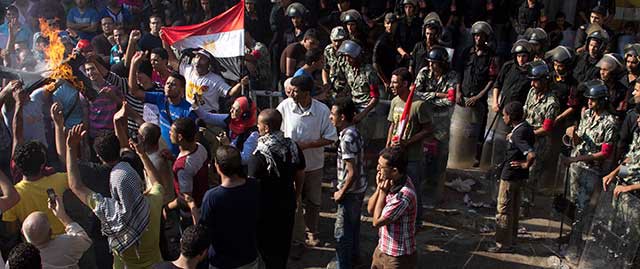
Back in April, Egyptians received a violent reminder that their post-revolutionary freedom to assemble in protest was a conditional one. That night was the first time activists moved demonstrations from Tahrir Square to the Israeli embassy in protest the Gaza occupation. By 2 a.m., the Egyptian army (known as the SCAF) had received orders to attack the group. Soldiers fired rubber bullets into the crowds and tear-gassed the corridor, killing one and taking hundreds into custody.
The message from the SCAF was clear: “You may gather in protest with our blessing — but Israel is off limits.”
But last Friday, five Egyptian border security guards were accidentally killed by Israeli Apache gunships. The casualties occurred as Israel was pursuing militants who, having just attacked Israeli troop convoys (updated to add: Israeli buses and cars were also targeted by the militants, and eight Israelis killed), were retreating into the uncontrolled, lawless Sinai. In the wake of these deaths, protesting against Israel has become fair game. By Saturday afternoon, a sit-in of thousands outside the Israeli embassy had entered its second day.
The Israeli embassy office in downtown Cairo is hidden in a nondescript concrete 21-floor residential structure. A small Israeli flag strung from the top floor is the only sign of the embassy’s presence in the building. Nearly invisible to passing pedestrians on this busy street, the flag is little more than a whispered announcement of Israel’s diplomatic mission in the country. This anonymity is emblematic of Egypt’s naïve and unsuccessful attempts to minimize its diplomatic relationship with Israel in the eyes of a largely disapproving public by simply hiding it away from view. The policy extends to the Ministry of Education, which prohibits any schools — public or private — from teaching any material related to Israeli history or Egyptian-Israeli relations.
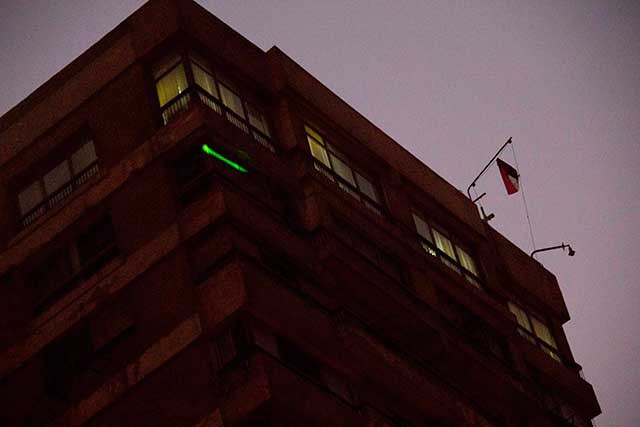
“All of this is absurd,” Nour, a 30 year-old Egyptian interior designer told me as we drove to the Israeli embassy protests. “Even if we wanted to, Egypt could never go to war with Israel. For all of the military aid the U.S. gives us, we’re only allowed to buy weapons to contain our own people. We’ve never been allowed to purchase the weapons systems necessary for a foreign invasion.”
Outside the embassy, a military cordon had gone up. A line of armored army personnel carriers had amassed along the front entrance of the property. Soldiers, looking bored and indifferent, sat atop them, machine guns pointed towards the crowd. In front of the vehicles stood a line of police officers and army soldiers in riot gear who watched and talked with protestors as, in the crowd, Israeli flags were burned amid chants of “Death to Israel” and “Allah Akbar.”
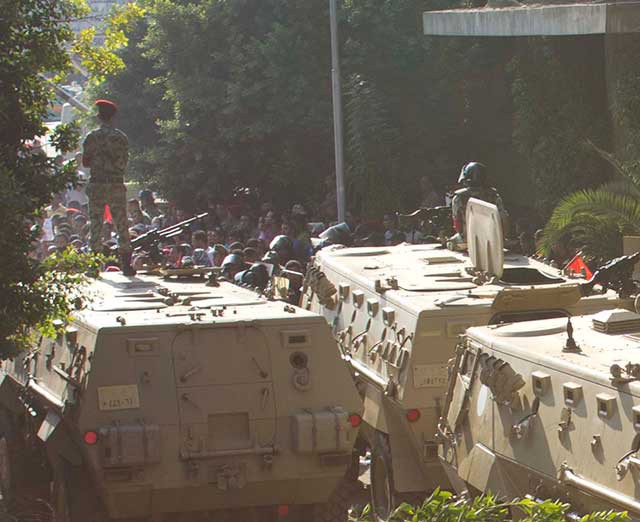
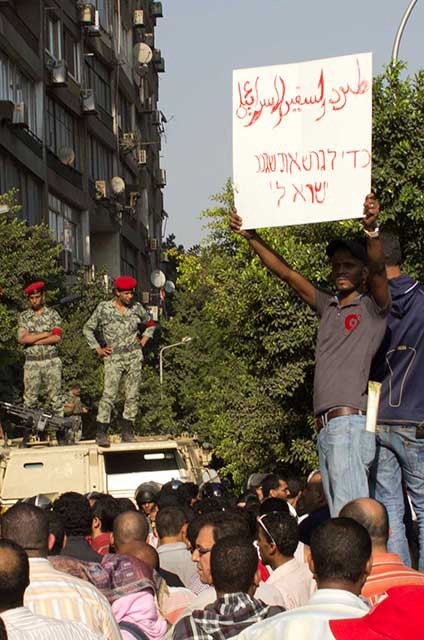
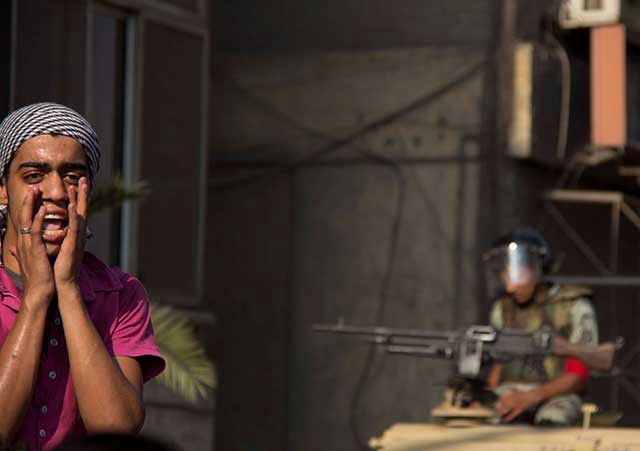
Yet, despite the midday heat and the imposing security presence, a spirit of ease prevailed, as if an unspoken guarantee of safety had been sent down the chain of command and the crowd somehow knew a repeat of April’s events was unlikely. In a country of factions — Salafis and Muslim Brothers; Copts and Muslims; military and civilians — a crowd had united around this rare opportunity to protest as a single entity against Israel. People reveled in this sudden freedom. Sweating beneath the sun, they used chains to beat the fallen barricades erected to safeguard the embassy’s building — but there was no dangerous edge to the scene. Gone were calls against the SCAF and demands to end the military trials that have left over 10,000 Egyptians incarcerated. Instead the crowd seemed content to swelter together while sending up chants to the empty Israeli embassy offices.
Even the Egyptian police, watching from beneath the visors of their black helmets, were a peaceful addition to the scene. The Egyptian police apparatus is the most despised social institution of this country; one blamed for decades of corruption and human rights abuses. It was these officers who were responsible for killing hundreds of revolutionaries in street battles throughout the revolution. Now this crowd had gathered to demand retribution on their behalf. In the crowd, there was little sense of irony about this — it didn’t matter. Israeli bullets had transformed the police guards from oppressors to the oppressed, from tyrants to martyrs.
“What do they want?” I turned to ask an 18-year-old Egyptian girl standing beside me, watching as a black flag with the Star of David on it was set on fire.
“We must cancel our relations with Israel,” she replied blankly.
By 4 a.m. on Sunday morning, the night sky had turned to pink and thousands remained. The night’s celebrity was ‘the Egyptian Flagman,’ Ahmed El-Shahat, who climbed 13 stories without a rope up the front of the building to remove the Israeli flag. An Egyptian flag was hung in its place. The scene began to feel like a carnival. I saw families with children, waving Egyptian flags, women, and teenagers shooting bottle rockets.
One of the rockets sailed up through the air and exploded with a crack as it hit the front window of the embassy office floor. An ovation rose from the delighted audience. It was a direct hit.
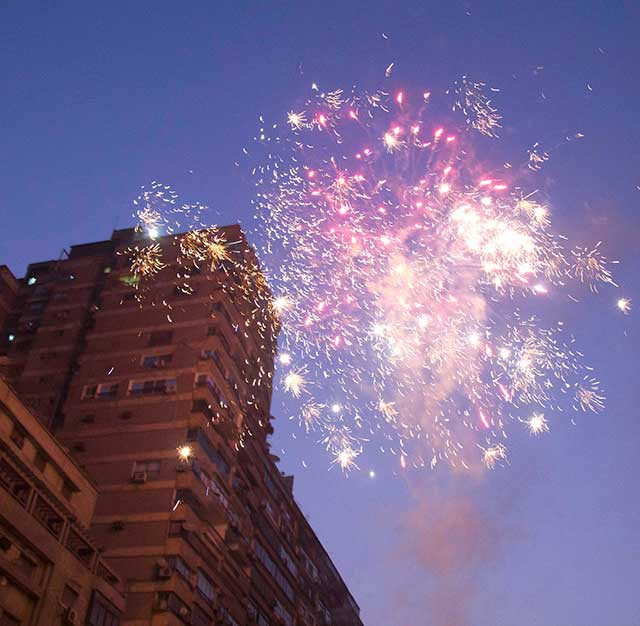
Christian Vachon lives in Cairo (he previously wrote for The Awl under the pseudonym Gordon Reynolds). He posts regularly to Twitter.
